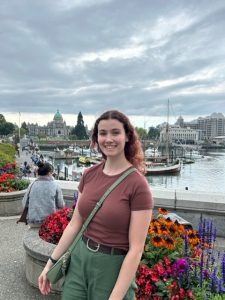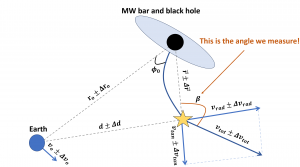 Isabella is a fourth-year undergraduate student studying astronomy and physics with a minor in math at the University of Toronto. She grew up in Vancouver, BC and now lives in Toronto. Her passion for astronomy and astrophysics stems from a love of all things sci-fi. Isabella is grateful to have had the opportunity to work with Prof. Jo Bovy and Dr. Fraser Evans this past summer.
Isabella is a fourth-year undergraduate student studying astronomy and physics with a minor in math at the University of Toronto. She grew up in Vancouver, BC and now lives in Toronto. Her passion for astronomy and astrophysics stems from a love of all things sci-fi. Isabella is grateful to have had the opportunity to work with Prof. Jo Bovy and Dr. Fraser Evans this past summer.
Outside of academics, Isabella can be found climbing, watching F1, and organizing observation nights with University of Toronto Amateur Astronomer’s Society (UTAAS).
What made you decide to participate in SURP?
I decided to participate in SURP because it gave me the opportunity to work on a specific research project with a clear objective. SURP projects cover a variety of topics, so I knew I’d spend the summer working on a project that really interested me.
Can you tell us about your research project?
Sure! I looked at hypervelocity stars (HVS) and the trajectories these stars take as they travel through the Milky Way at incredibly high speeds before eventually leaving the galaxy entirely. Specifically, I looked at how the Milky Way bar influences HVS and if it is possible to measure this deflection.
What is your favourite thing about SURP?
There were a lot of amazing things about SURP and it’s hard to pick just one! I really enjoyed the weekly seminars which ranged from presentations on cutting-edge research to practical skills like how to write a CV. Above all, I enjoyed learning from my amazing supervisors who helped me grow as a researcher over the course of the program.
Can you explain how SURP has been different from your undergrad work?
The main difference between SURP and my undergrad work is the specialization and independence that comes from conducting your own research. SURP provided me an opportunity to study a specific research question requiring a deep understanding of a few topics and processes. This differs from my undergrad courses which focus on understanding a wide variety of physical concepts and processes at a more general level. I enjoyed having the independence to work on questions regarding my research without having the structure of an assignment.
What are your plans for the future?
The process of conducting research is something that I really like, and I hope to continue on to graduate school. I also want to continue my involvement in astronomy outreach. I think astrophysics is such an exciting field—there is always more to learn and new questions to be asked!
The Dunlap Institute for Astronomy and Astrophysics at the University of Toronto is an endowed research institute with over 80 faculty, postdocs, students, and staff, dedicated to innovative technology, ground-breaking research, world-class training, and public engagement.
The research themes of its faculty and Dunlap Fellows span the Universe and include: optical, infrared and radio instrumentation, Dark Energy, large-scale structure, the Cosmic Microwave Background, the interstellar medium, galaxy evolution, cosmic magnetism, and time-domain science.
The Dunlap Institute, the David A. Dunlap of Astronomy and Astrophysics, and other researchers across the University of Toronto’s three campuses together comprise the leading concentration of astronomers in Canada, at the leading research university in the country.
The Dunlap Institute is committed to making its science, training, and public outreach activities productive and enjoyable for everyone of all backgrounds and identities.

